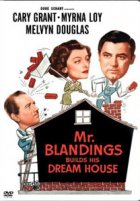
Mr. Blandings Builds His Dream House Page #5
- APPROVED
- Year:
- 1948
- 94 min
- 519 Views
JIM:
...Who did this?
INSERT NEWSPAPER, a section of which has been cut out.
BACK TO SCENE.
BETSY:
(very matter-of-factly)
I did.
She holds out her hand to Joan, who, automatically, and
without looking up hands her the salt.
JIM:
I have repeatedly told you --
(ducking as Gussie
comes back with coffee)
-- don't cut up the morning paper
until I've had a chance to look at
it!
BETSY:
I'm sorry, father. It's necessary
research.
She hands the salt back to Joan who automatically passes it
to Muriel.
JIM:
(with some sarcasm)
I suppose this is another of Miss
Stellwagon's so-called Progressive
Projects?
MURIEL:
(using salt and handing
it to Jim)
Now dear, there just isn't any point
in sending your children to an
expensive school if you're going to
undermine the teacher's authority in
your own dining room.
JIM:
I'm not undermining anything. I happen
to be in the advertising business
and keeping abreast of the times is
important to me.
MURIEL:
And so is your children's education.
JIM:
That's not the point.
MURIEL:
It certainly is.
JIM:
It certainly is not!
JOAN:
(without looking up
from her magazine)
Bicker, bicker, bicker.
JIM:
You eat your cornflakes!
Jim ducks as Gussie passes back on her way to the kitchen.
MURIEL:
(handing Joan toast)
Joan, every time your father and I
have a lively discussion we aren't
necessarily bickering.
(to Betsy; solicitously)
What is it, dear, another English
composition?
BETSY:
(taking toast from
Joan)
Miss Stellwagon has assigned each of
us to take a want ad and write a
human interest theme about it.
(to Jim; passing toast
to him)
disintegration of our present society.
JIM:
(taking toast, not
looking up from his
paper)
I wasn't aware of the fact that our
society was disintegrating.
BETSY:
I didn't expect you to be, father.
Miss Stellwagon says that middle-
class people like us are all too
prone to overlook the pressures and
tensions which befall the less
fortunate members of our community.
Jim puts down the paper, turns to Muriel.
JIM:
(with great restraint)
Muriel, I know it's asking a lot,
but just one morning I would like to
sit down and have breakfast without
social significance!
Picks up his paper.
MURIEL:
Jim, you really might take a little
more interest in your children's
education.
JOAN:
(without looking up)
You can't squeeze blood from a turnip.
Jim reacts with painful resignation, folds his arms, puts
down the paper, turns slowly to Betsy.
JIM:
All right. All right. I'll listen.
BETSY:
(picking up her
scrapbook)
It's just twenty-four words. But in
simple eloquence it mirrors a minor
tragedy of our times.
JIM:
(quietly)
Well?...
BETSY:
(reading)
"Forced to sell. Farm dwelling, oak
grove, apple orchard, trout stream,
hay fields, four barns, seclusion,
superb view, original beams, paved
highway, acreage...
(with emotion)
Will sacrifice..."
Pause.
JIM:
Go on.
BETSY:
(simply)
That's all.
JIM:
That's all?!
BETSY:
You don't see it, do you, father?
JIM:
No. Fellow wants to sell a house so
he puts an ad in the paper. What did
you expect him to do, take it to the
United Nations!
MURIEL:
There must be more to it than that.
(to Betsy)
Isn't there, dear?
Translation
Translate and read this script in other languages:
Select another language:
- - Select -
- 简体中文 (Chinese - Simplified)
- 繁體中文 (Chinese - Traditional)
- Español (Spanish)
- Esperanto (Esperanto)
- 日本語 (Japanese)
- Português (Portuguese)
- Deutsch (German)
- العربية (Arabic)
- Français (French)
- Русский (Russian)
- ಕನ್ನಡ (Kannada)
- 한국어 (Korean)
- עברית (Hebrew)
- Gaeilge (Irish)
- Українська (Ukrainian)
- اردو (Urdu)
- Magyar (Hungarian)
- मानक हिन्दी (Hindi)
- Indonesia (Indonesian)
- Italiano (Italian)
- தமிழ் (Tamil)
- Türkçe (Turkish)
- తెలుగు (Telugu)
- ภาษาไทย (Thai)
- Tiếng Việt (Vietnamese)
- Čeština (Czech)
- Polski (Polish)
- Bahasa Indonesia (Indonesian)
- Românește (Romanian)
- Nederlands (Dutch)
- Ελληνικά (Greek)
- Latinum (Latin)
- Svenska (Swedish)
- Dansk (Danish)
- Suomi (Finnish)
- فارسی (Persian)
- ייִדיש (Yiddish)
- հայերեն (Armenian)
- Norsk (Norwegian)
- English (English)
Citation
Use the citation below to add this screenplay to your bibliography:
Style:MLAChicagoAPA
"Mr. Blandings Builds His Dream House" Scripts.com. STANDS4 LLC, 2025. Web. 11 Feb. 2025. <https://www.scripts.com/script/mr._blandings_builds_his_dream_house_660>.







Discuss this script with the community:
Report Comment
We're doing our best to make sure our content is useful, accurate and safe.
If by any chance you spot an inappropriate comment while navigating through our website please use this form to let us know, and we'll take care of it shortly.
Attachment
You need to be logged in to favorite.
Log In